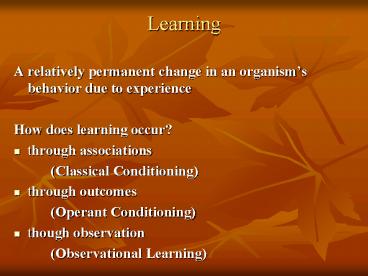Learning - PowerPoint PPT Presentation
1 / 45
Title:
Learning
Description:
Interval schedule ... Interval schedule. Variable interval. Reward for ... The animal mind. Chimp (Sultan) and bananas. Mental trial-and error. Smart ravens ... – PowerPoint PPT presentation
Number of Views:42
Avg rating:3.0/5.0
Title: Learning
1
Learning
- A relatively permanent change in an organisms
behavior due to experience - How does learning occur?
- through associations
- (Classical Conditioning)
- through outcomes
- (Operant Conditioning)
- though observation
- (Observational Learning)
2
Non-associative learningthe simplest form of
learning.
The simplest form of learning. The response to
a repeated stimulus will decline
across repetitions. A form of non-associative
learning, it involves only one stimulus.
- Habituation
- The response to a repeated stimulus will decline
across repetitions.
- Sensitization
- The response to an important stimulus will
increase for a while.
3
Classical Conditioning
- first studied by
- Ivan Pavlov (1849-1936)
- two stimuli close together allow a response to
transfer from one to the other - Pavlovs explanation excitatory links form
between centres in the brain this process
occures automatically.
4
Salivary Conditioning Apparatus
... how to ask the right question ....
5
Classical conditioning
- Unconditioned Stimulus (UCS or US)
- Unconditioned Response (UCR or UR)
- Conditioned Stimulus (CS)
- Conditioned Response (CR)
6
Pavlovs Work
- Before Conditioning
- During Conditioning After Conditioning
- The neutral stimulus (the tone) becomes a CS
through association
7
How long does it last?
- Extinction
- Elimination of a learned response by removal of
the unconditioned stimulus - Spontaneous Recovery
- Re-emergence of an extinguished conditioned
response after a rest period
8
(No Transcript)
9
(No Transcript)
10
Generalization
- Response Generalization
- The tendency to respond to a stimulus that is
somewhat similar to the conditioned stimulus
11
Discrimination
- Stimulus Discrimination
- The ability to distinguish between different
stimuli
12
Real-Life Examples
- Conditioned Taste Aversion
- a taste (CS) associated with a toxin (US) leads
to nausea (UR) - later, the taste alone evokes nausea (CR)
Biological restraints
13
Rats are sensitive to taste
Birds to sight
14
- Drug Tolerance
- tolerance is specific to specific environments
(e.g. bedroom) - taking drug in unfamiliar environment leads to
lack of tolerance
15
phobias
dangerous stimulus associated with neutral one
results fear from the later
16
Little Albert
17
Instrumental or Operant Conditioning
- - involves stimuli with
- motivational significance
- the consequences of
- behaviors influence the
- likelihood of their being
- repeated
- far more flexible than classical
- conditioning, can give rise to novel responses.
B. F. Skinner
18
Skinner-box
19
(No Transcript)
20
Trial and error
21
The dog gets time to find the lever
- .
22
Operant Conditioning
- for Classical Conditioning
- expectations are important
- for Operant Conditioning
- outcomes are important
23
Thorndikes Law of Effect
- Behaviors that
- have pleasurable consequences tend to be
- repeated under similar circumstances
- Good consequence? Do it again!
- Bad consequence? Dont do it again!
24
Schedules of Reinforcement
- Rate at which a reinforcer is delivered
- influences the nature of response(s)
- Continuous Reinforcement
- reinforcing the desired response each time it
occurs - (rapid learning, rapid extinction)
25
- Partial Reinforcement
- reinforcing a response only part of the time
- results in slower acquisition, greater
resistance to extinction - Partial Reinforcement Schedules
- Ratio schedule
- Fixed ratio
- Variable ratio
26
Fixed ratio
- Reward after a fixed number of responses (people
being paid on a "commission)
27
Variable ratio
- Reward after an unpredictable number of responses
- (inserting coins and pulling the handle of a
"one-armed bandit.)
28
Interval schedule
- Fixed interval Reward after a specified length
of time from the last reinforcement (checking
your mail in the mailbox)
29
Interval schedule
- Variable interval
- Reward for first response after
- a variable amount of time
- (pressing the "redial" button
- when there is a "busy" signal on the other end of
the line.)
(electronic mail)
30
Reinforcement
Punishment
Positive
Negative
Negative
Positive
Stimulus is ...
Stimulus is ...
Stimulus is ...
Stimulus is ...
Presented
Removed
Presented
Removed
Behavior..
Behavior...
Behavior...
Behavior...
Increases
Increases
Decreases
Decreases
31
Reinforcement Punishment
32
Punishment
- decreases likelihood of behavior happening
again, because the consequence is not good - Positive Punishment
- Negative Punishment
33
Problems with Punishment
- Punished behavior is not forgotten, it's
suppressed - behavior returns when punishment is no longer
eminent - Physical Punishment Linked to Increased
Aggression - shows that aggression is a way to cope with
problems - Creates fear that can generalize to desirable
behaviors, e.g. fear of school, learned
helplessness, depression - Does not necessarily guide toward desired
behavior - reinforcement tells you what to do,
- - punishment tells you what not to do
34
Operant Conditioning Concepts
- Shaping
- Reducing complex behaviors into several more
simple behaviors - Reinforcing successive approximations to the
complex behavior
35
Escape-learning
- when meeting a dangerous stimulus
36
Avoidance learning
- Beware of phobias!
37
COGNITIVE APPROACHES
38
Observational Learning
Albert Bandura. Bobo Doll Study
- occurs when an organisms responding is
- influenced by the observation of others (models).
- Children watched a film of a women being
aggressive towards a Bobo doll. In the playground
the children imitated the women in the film
acted aggressively towards the bobo doll
39
Cognitive-Social Theory
Cognitive maps in rats men (Edward Tolman 1948)
- mental representations
- images
40
Latent learning
- learning that has occurred but not currently
manifested in behavior
41
Cognitive-Social Learning
Learned Helplessnes (Seligman, 1975)
- the expectancy that one cannot escape aversive
events - motivational learning deficits result from the
belief.
42
Human depression
43
Learning by insight
- Kohlers classic experiment
- The animal mind
- Chimp (Sultan) and bananas
44
- Mental trial-and error
45
Smart ravens































